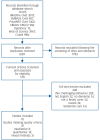Behavioural and psychological symptoms in dementia and the challenges for family carers: systematic review
- PMID: 26989095
- PMCID: PMC4853642
- DOI: 10.1192/bjp.bp.114.153684
Behavioural and psychological symptoms in dementia and the challenges for family carers: systematic review
Abstract
Background: Tailored psychosocial interventions can help families to manage behavioural and psychological symptoms in dementia (BPSD), but carer responses to their relative's behaviours contribute to the success of support programmes.
Aims: To understand why some family carers have difficulty in dealing with BPSD, in order to improve the quality of personalised care that is offered.
Method: A systematic review and meta-ethnographic synthesis was conducted of high-quality quantitative and qualitative studies between 1980 and 2012.
Results: We identified 25 high-quality studies and two main reasons for behaviours being reported as challenging by family carers: changes in communication and relationships, resulting in 'feeling bereft'; and perceptions of transgressions against social norms associated with 'misunderstandings about behaviour' in the relative with dementia. The underlying belief that their relative had lost, or would inevitably lose, their identity to dementia was a fundamental reason why family carers experienced behaviour as challenging.
Conclusions: Family carers' perceptions of BPSD as challenging are associated with a sense of a declining relationship, transgressions against social norms and underlying beliefs that people with dementia inevitably lose their 'personhood'. Interventions for the management of challenging behaviour in family settings should acknowledge unmet psychological need in family carers.
© The Royal College of Psychiatrists 2016.
Conflict of interest statement
None.
References
-
- Fauth EB, Gibbons A. Which behavioral and psychological symptoms of dementia are the most problematic? Variability by prevalence, intensity, distress ratings, and associations with carer depressive symptoms. Int J Geriatr Psychiatry 2014; 29: 263–71. - PubMed
-
- Hamel M, Gold DP, Andres D, Reis M, Dastoor D, Grauer H, et al. Predictors and consequences of aggressive behaviour by community based dementia patients. Gerontologist 1990; 30: 206–11. - PubMed
-
- De Vugt ME, Stevens F, Aalten P, Lousberg R, Jaspers N, Winkens I, et al. Do carer management strategies influence patient behaviour in dementia? Int J Geriatr Psychiatry 2004; 19: 85–92. - PubMed
Publication types
MeSH terms
Grants and funding
LinkOut - more resources
Full Text Sources
Other Literature Sources
Medical


